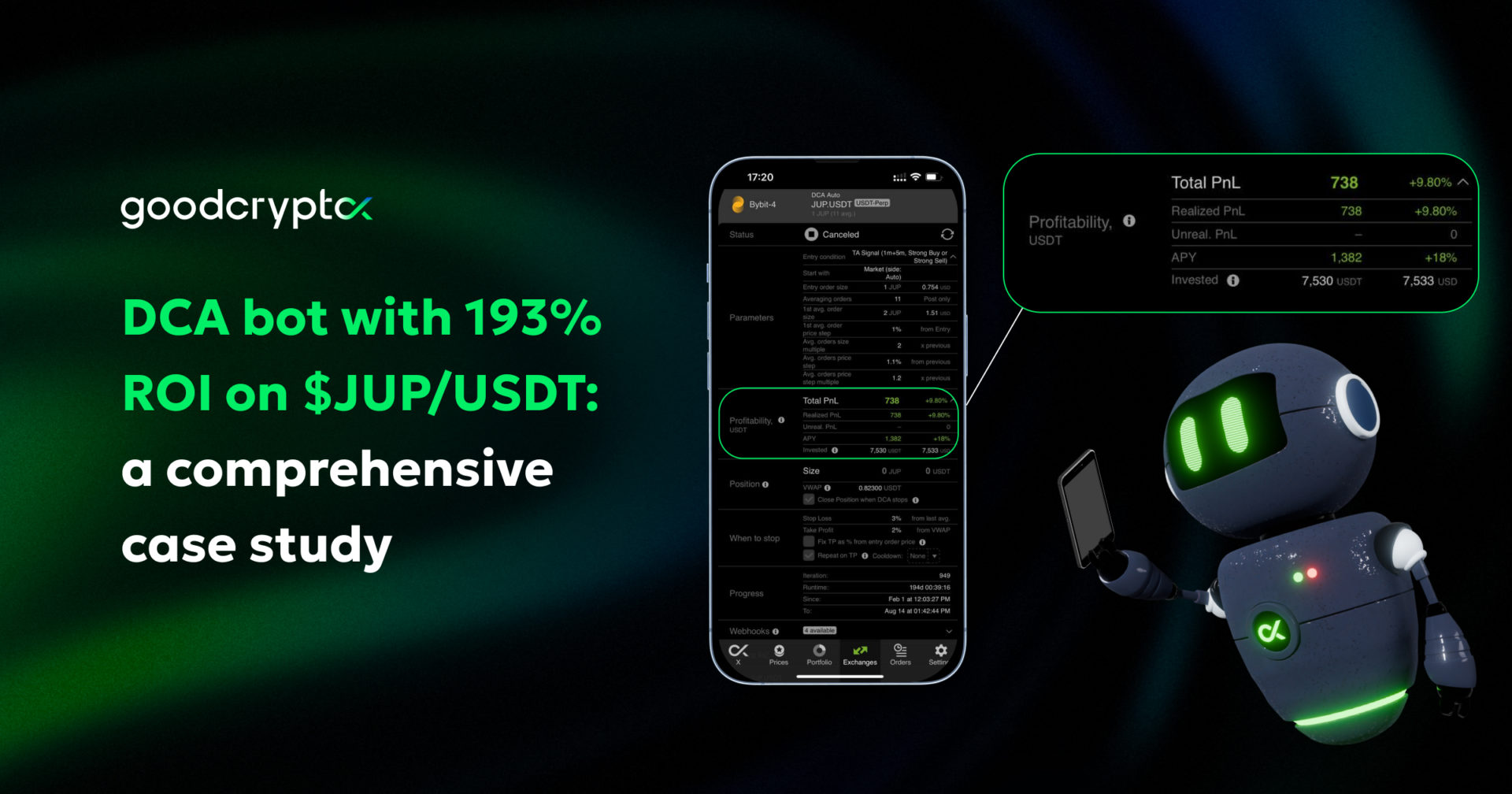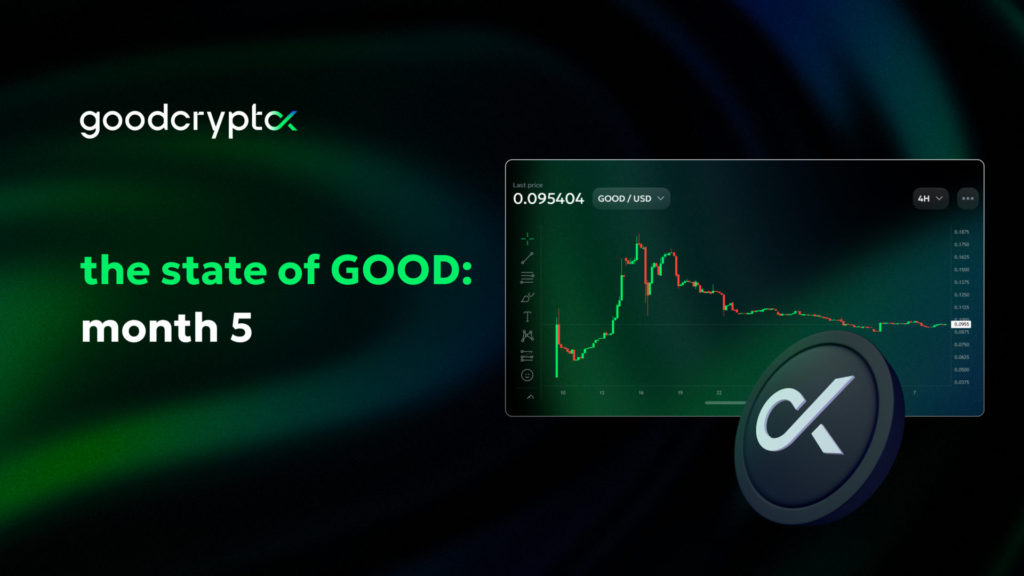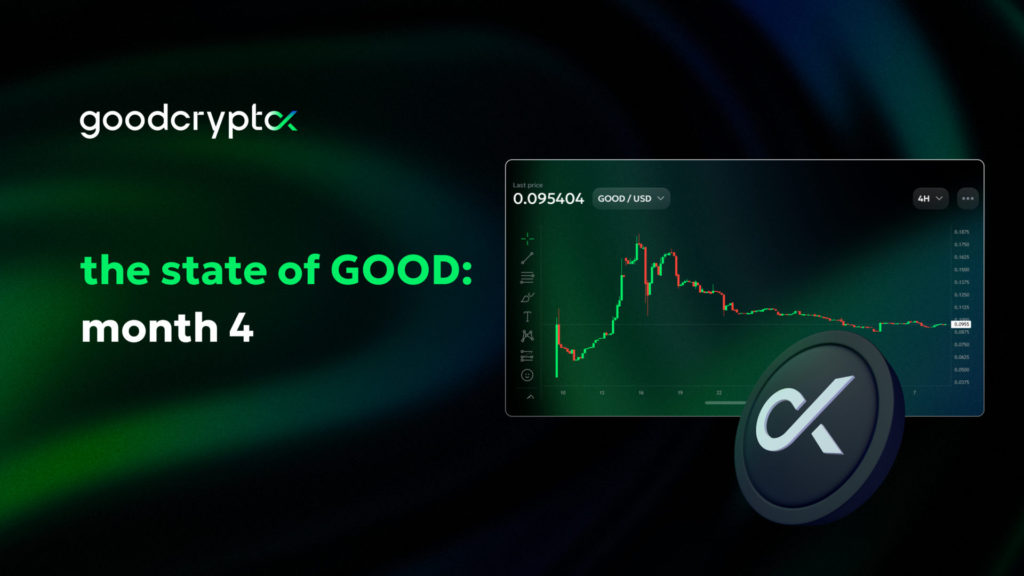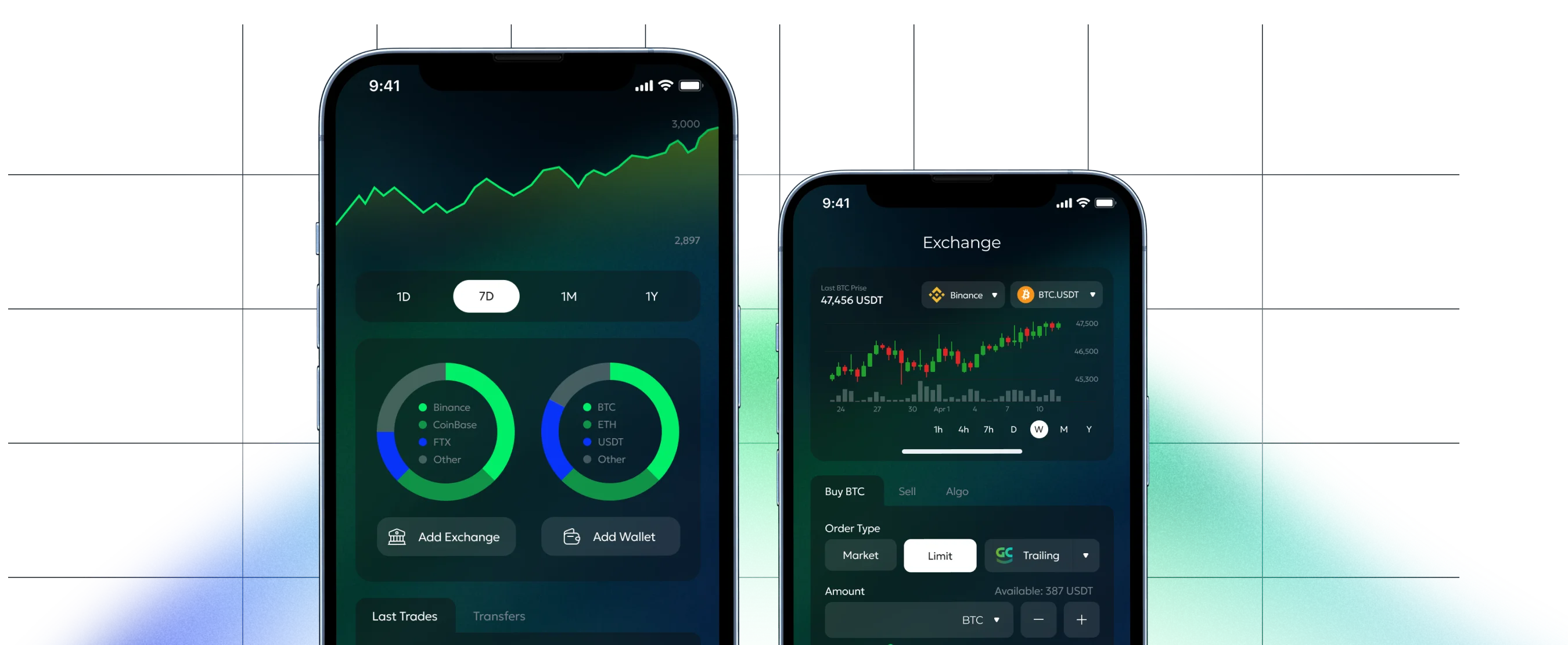Dollar-cost averaging (DCA) is one of the most popular trading strategies, designed to help you accumulate long-term holdings on market dips while eliminating much of the routine from your trading process. However, running a DCA crypto bot isn’t easy. While it may seem simple in theory, there are many hidden pitfalls you will encounter once you start implementing it in the market. That’s why hands-on trading cases are one of the best ways to gain practical knowledge of running a DCA bot.
Previously, we have already covered the BTC/USD DCA trading case, where a user achieved an impressive 60% ROI in just 9 days. Today we will review another case—a $JUP/USDT DCA bot run by a goodcryptoX user for a much longer period of time – over 6 months. According to the stats the user sent to us, the bot generated over $730 in PNL, equivalent to approximately 193% ROI, or almost 360% in APY. Let’s explore this trading case more in detail and try to find out the basic principles of how you can improve your DCA bot strategy.
our DCA user case on $JUP/USDT
First, let’s start with the performance metrics of the $JUP/USDT DCA trading bot shared by our user:
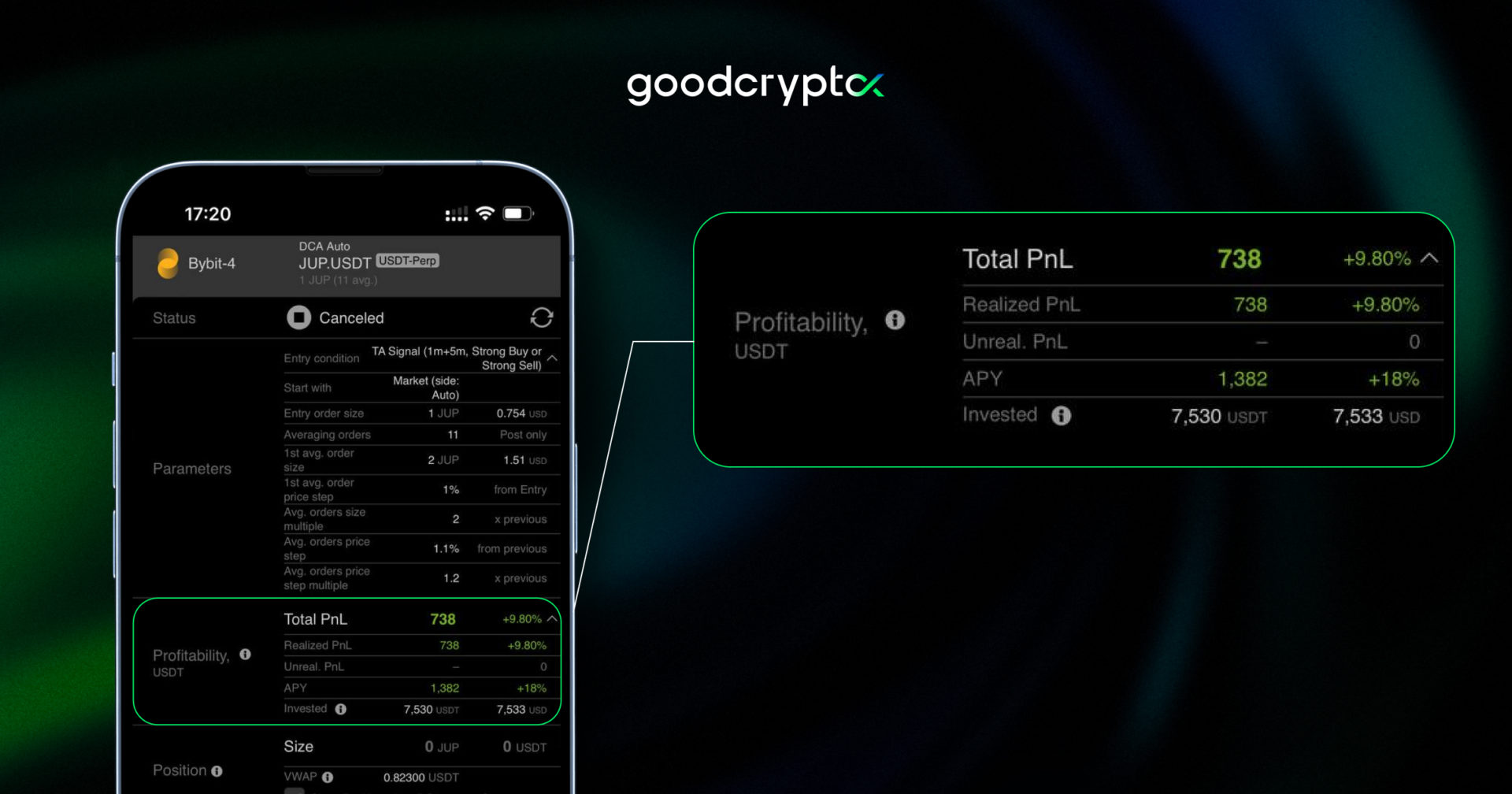
- Trading Venue: Bybit Futures;
- Bot runtime: 6 months;
- Invested: $7.530;
- PNL: $730;
- APY: ~18%.
However, keep in mind that GoodCrypto app calculates your positions’ performance including leverage, which means that the actual ROI of the bot looks like this:
- Invested amount: $7.530;
- Leverage: 20x;
- Funds used (without leverage): ~$376.5 ;
- ROI: PNL/ Funds used (without leverage) = 730/376.5 ≈ 193%;
- APY: ~18% (APY without leverage) *20 (leverage) ≈ 360%.
Now it looks more impressive, huh? 🔥
Important: Always remember to keep an extra deposit outside your trades when using leverage. This helps reduce the impact of losses on your portfolio and lets you recover faster if your bots’ SLs are hit multiple times.
This $JUP/USDT trading bot serves as a perfect example of a trading strategy able to operate over a long period of time, validating it as a robust and effective alternative to manual trading. However, understanding key principles when running a DCA bot is crucial. Without this knowledge, you could face poor results or even losses.
Let’s dive deeper into this bot’s setup and spot some key rules and insights that may help improve your own DCA bot performance.
bot setup review
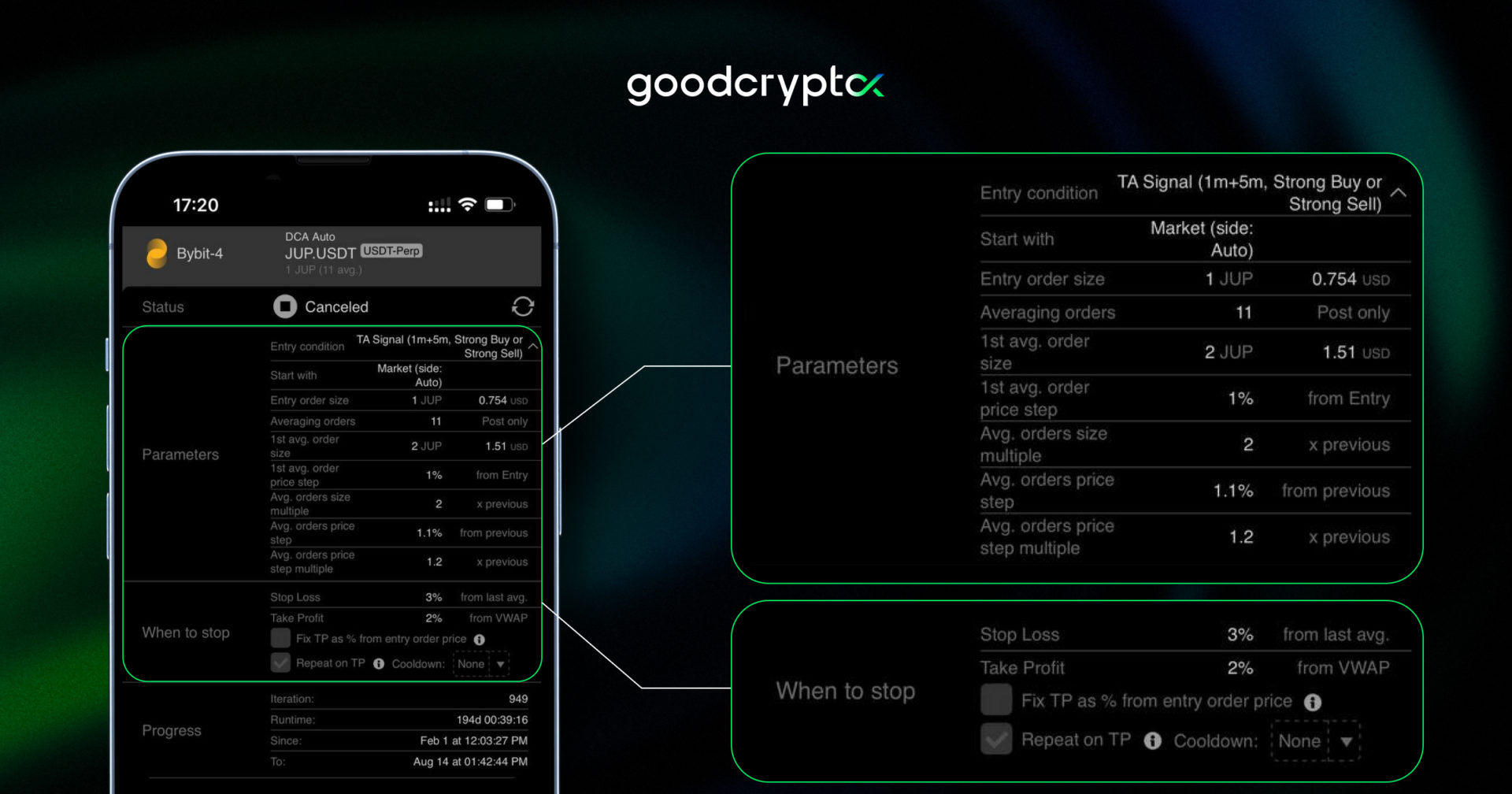
- Initial order entry size: 1 $JUP ($0.7);
- Averaging orders: 11;
- First averaging order: 2 JUP ($1.4);
- Order size increases for every av. order: 2x from the previous one;
- Price step for averaging orders: 1.1%;
- Price step multiplier: 1.2x from the previous step;
- TP & SL: 2%/3%;
- TA/manual mode: Auto (TA signal), Strong buy % Strong Sell on 1m/5m timeframes;
- Short/Long mode: Auto – GoodCrypto app itself chooses between short and long modes.
The key to a successful DCA bot setup is identifying the right price volatility range. This is critical when adjusting price steps and step multipliers in GoodCrypto’s DCA bot. Miscalculating can lead to two main issues:
- If the price range is set too narrow, you risk liquidation or triggering stop-loss orders if the market moves against you too fast.
- If the price range is set too wide, you could miss out on profits from executed trades.
Ensure you pay close attention to the potential upside and downside price movement range to succeed with the bot.
In this bot setup, the number of averaging orders and their size multiplier are critical to executing the strategy effectively. With 11 averaging orders and a 2x order multiplier, the last averaging order’s size is 2^11 times larger than the initial entry trade.
This configuration reflects the user’s strategy, aiming to trigger some averaging orders instead of relying on an immediate favorable market move. This approach allows the user to continually average down his or her position and benefit from market rebounds without needing to predict exact price movements. If done correctly, this creates a win-win scenario with two possible outcomes:
- The market moves in your favor, hits your TP, and you exit with a profit;
- The market moves against you, but the DCA bot averages down your position until the price bounces back, hitting your adjusted TP.
You must also notice that the Stop Loss percentage is larger than the Take Profit, which fully contradicts the traditional risk-reward approach where the reward should be higher than the potential loss. However, the main goal here is to avoid getting knocked out from the market before it rebounds from a support or resistance level, allowing you to exit with a profit.
Setting TP and SL incorrectly can cause two main issues:
- If you set the Take Profit too far from your current position, chasing the big profits, you risk missing the chance to exit the market with a profit when the price starts bouncing back;
- If you set the Stop Loss too close to your position, trying to lose less from every DCA bot cycle, you may be knocked out of the market before the price bounce occurs, leaving you with a loss and an unrealized opportunity to secure profit later.
Finally, this setup eliminates the need for constant manual market monitoring and analysis. Instead, you can set up the TA signals mode so the GoodCrypto app can detect price movements and capitalize on them automatically, allowing you to avoid betting directly on future market movements. In our case, the user relied entirely on TA signals, avoiding manual entries, letting the bot work for 6 months, and only turned it off when market conditions became uncertain. Sounds like solid proof of the effectiveness of GoodCrypto TA signals, doesn’t it?
Want even more DCA case study reviews? Join the Telegram channel where our Founder and CEO, Maxim Hramadtsou shares exclusive insights, his own case studies and proven DCA bot settings.
Conclusion
The DCA trading bot remains one of the most effective strategies on the market, allowing traders to accumulate holdings over time and capitalize on price bounces. However, the success of your DCA bot heavily depends on customization, including factors like market volatility, portfolio size, and whether you’re trading spot or futures.
GoodCrypto provides you with an extensive range of powerful tools that make implementing a DCA trading strategy easier and more efficient, including:
- Simple and easy-to-understand approach to implementing DCA strategy;
- Ability to launch bots manually or automatically using GoodCrypto’s in-app TA signals;
- Opportunity to customize your trading bots based on the amount of the averaging order, av. orders multiplier, price step, price step multiplier, and more;
- Highly flexible risk management settings.
Start your first DCA bot now and unlock new levels of efficiency and profitability with GoodCrypto.



